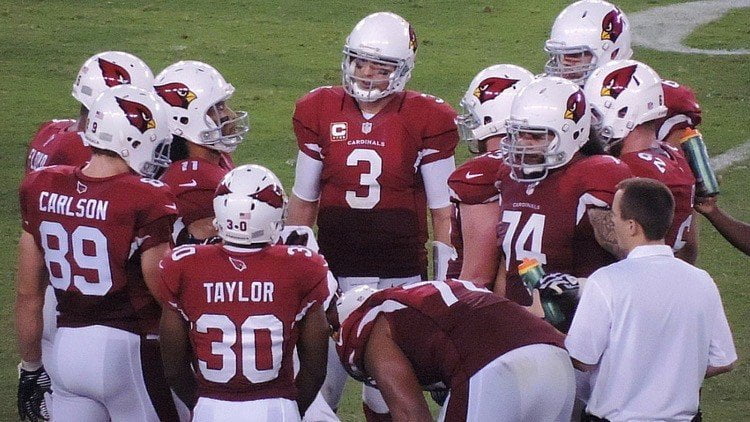
You can listen to an audio version of this post here.
[powerpress]
Lawrence Okoye is a British born man of Nigerian heritage who holds the British record for the discus throw at 68.24 meters. He also has an open offer from the prestigious Oxford University Law school to come get his law degree when he is ready. He’s a smart great athlete. Unfortunately what he may mostly be known for right now is being cut from the Arizona Cardinals for parking in the wrong parking spot.
I watched an amazing series created by Amazon.com and NFL Films called All or Nothing that follows the Arizona Cardinals during the 2015 season from the NFL Draft through the NFC Championship game loss against the Carolina Panthers. There are a million leadership lessons you can learn in this series, but three things stood out to me when Okoye was cut from the team.
Everything Speaks
Part of my personal philosophy is that everything speaks. My mother always said that a person’s mouth can say anything, but their actions will never lie. Every action you take or don’t take influences how those who follow you perceive you. Knowing that, you have to be clear about what message you want to communicate and intentionally align your actions with that message.
A parent who expresses love for family and vowing to do anything for them has to have actions that match those words. All too often these same parents work late hours, travel a lot, miss special events of their spouse and children and when they are home, stay glued to the laptop or phone. They’re saying I value you with their words, but communicating, work is more valuable with their actions.
That doesn’t mean you can’t have a demanding job. It just means that you should carve out time for things that are important to your spouse and kids on a regular basis if you want them to believe that they matter to you.
When the Cardinals’ head coach Bruce Arians discussed cutting Okoye with the team President and the GM, he said that “Okoye has a different sense of entitlement as a former Olympian.” In an earlier scene, Arians had made a big deal out of parking in the right spaces. He said, “We ain’t got many rules,” and this was one that shouldn’t be broken.
Okoye didn’t have to say one word to display a sense of entitlement to his coaches. Actions are like that because everything speaks. Okoye may have been the most humble guy in the world, but he lost control of the message he was communicating by his actions.
Attention to Detail is Key to a High Level of Success
Throughout the season, when the Cardinals lose, it’s because they make basic mistakes. Small details that they should have gotten right in practice. But you can see each week when they have a bad week of practice, they lose. And a bad week of practice looks mostly like not paying attention to the small details. Are they lining up correctly, are they putting in the right effort, do they understand the concepts they are trying to drill?
They would miss the small details in practice and then they’d miss those same small details in the game. The problem is by drilling poor attention to detail, their performance was the same. Under game pressure those details were magnified and multiplied. We know pressure busts a pipe or makes a diamond and in the case of the Cardinals, pipes were busting all over the place. Getting his players to buy in to paying attention to detail was the difference between winning and losing.

Okoye couldn’t follow one simple rule about where to park. He was a practice player which means he played on the team that simulated the game plan of the opponents each week to prepare the starters. He was on the bottom of the totem pole and had every incentive to impress the coaches and work his way up. But at that low level, he showed himself to be the wrong type of player the Coach needed to win a championship. He failed with this small detail so there was no telling the kind of mistakes he’d make when there were bigger things to do the right way.
Bad Habits Left Unaddressed Grow on a Team Like Weeds
I talk to so many leaders that complain bitterly about people on their team or in their company that have made so many mistakes even though they have been given so many second chances. I always ask, if I was hiring someone to do the job that person is doing and asked you if I should hire them would you advise me to? Invariably the answer is NO!
Then I ask them why they still keep the person on board and the reasons why are too many to count. After a couple of weeks these same leaders start to notice problems creeping up with other people on their team. Folks start showing up late, the work area isn’t as clean as it usually is, assignments aren’t completed with the same quality or they fall behind schedule.
When you allow poor performance on the team, everyone else will see that either it doesn’t pay to be excellent or that it’s ok to be mediocre. Look, he gets to do it so why can’t I? Being on time every day is so much work, why bother if there’s no consequence? You should recognize this idea from the series on the Leadership Loop.

Coach Arians had to get rid of Okoye or people like him or he’d find these kinds of problems all over his team and they’d become unmanageable. In fact, consistent attention to detail was never quite reached. When they finally lost badly to the Panthers, the scoring difference was big. But the game was significantly impacted by 4 or 5 detail oriented mistakes. And those mistakes were the difference between going to the Super Bowl and getting blown out.
Deal With Your Own Okoyes
As a leader examine your organization and see if you have people on your team who are Okoyes waiting to undermine all of your planning and vision.
Recognize that everything speaks and design the message you want to communicate. Then make sure you behave in a way that reinforces that message and hold the members of your team or staff to that same standard.
Value a high attention to detail. Get clear about the details that are important and execute those details at a high level. Develop a method for monitoring those details and an accountability system for checking to see how you and your team are handling them. Review where you are falling short and develop plans to improve.
Finally, monitor the bad habits on your team and find ways to drive them out. The first is to use the Leadership Loop to address them as individuals and give them the opportunity to improve. Failing that, upgrade the talent. When you have a clear vision of what success looks like, you define the people you need to accomplish it. And if the ones you have don’t fit, move on from them.
The Cardinals have grown from an organization who was the punching bag of the NFL to a perennial contender. And cutting Okoye was an example of them sticking to the standards they’ve developed. As you do the same in your life and business, success will be within your reach.
